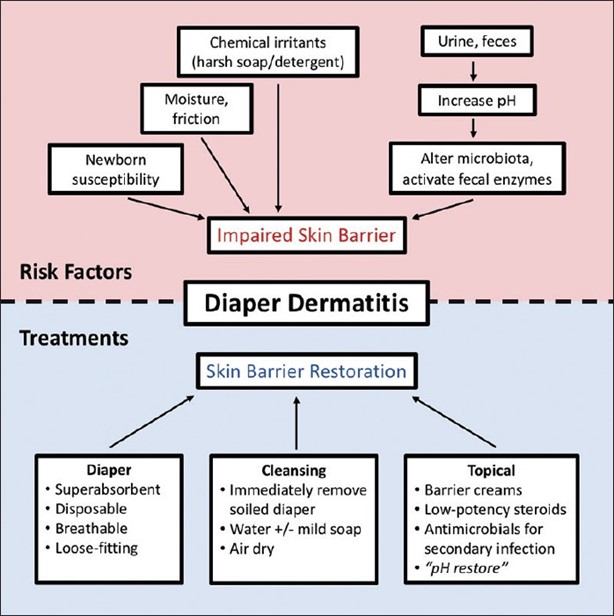The mother of a 7-month-old brings the infant to the clinic because the skin in the diaper area is excoriated and red, but there are no blisters or bleeding. The mother reports no evidence of watery stools. Which nursing intervention should the nurse implement?
Instruct the mother to change the child's diaper more often.
Ask the mother to decrease the infant's intake of fruits for 24 hours.
Encourage the mother to apply lotion with each diaper change.
Tell the mother to cleanse with soap and water at each diaper change.
The Correct Answer is A
The excoriated and red skin in the diaper area suggests the presence of diaper dermatitis, which is commonly caused by prolonged exposure to moisture and irritants such as urine and feces. Changing the diaper more frequently helps to minimize the exposure to these irritants and promotes better skin hygiene.
Asking the mother to decrease the infant's intake of fruits for 24 hours is not necessary unless there is evidence of diarrhea or specific dietary concerns. Fruits are generally a healthy part of an infant's diet and do not directly cause diaper dermatitis.
Encouraging the mother to apply lotion with each diaper change may not be recommended in this case, as lotions and creams can further trap moisture and exacerbate the condition. It is best to keep the area clean and dry.
Telling the mother to cleanse with soap and water at each diaper change may be too harsh for the infant's sensitive skin. Plain water or mild, fragrance-free wipes are typically sufficient for cleaning the diaper area. Soap can be drying and irritating to the skin, so it is generally not necessary unless there is a specific indication.

Nursing Test Bank
Naxlex Comprehensive Predictor Exams
Related Questions
Correct Answer is B
Explanation
MRSA is a highly contagious bacteria that can easily spread from person to person through direct contact or contact with contaminated surfaces. By instructing the family to adhere to contact precautions, the nurse can help prevent the spread of MRSA to the client's postoperative wound. Contact precautions typically involve wearing gloves and a gown when in direct contact with the client or the client's immediate environment.
While reporting any increase in the white blood cell count, changing the surgical dressing when soiled, and wearing a face mask during wound care are all important aspects of postoperative care, they are not specifically targeted at preventing the recurrence of MRSA. Adhering to contact precautions is the most effective measure to prevent the spread of MRSA and protect the client from further infection.
Correct Answer is D
Explanation
The correct answer is choice D. Demonstrate to the PN how to position the client more effectively for the procedure.
Choice A rationale:
Arranging for unlicensed assistive personnel to assist the PN during the procedure does not address the incorrect positioning of the client. The priority is to ensure the client is positioned correctly for the sigmoidoscopy, which is typically on the left side with knees drawn toward the chest.
Choice B rationale:
Acknowledging that the PN has positioned the client safely and correctly is not appropriate because the flat prone position is incorrect for a sigmoidoscopy. The correct position is on the left side with knees drawn toward the chest.
Choice C rationale:
Assuming care of the client and assigning the PN to the care of a different client does not address the educational opportunity. It is important to demonstrate the correct positioning to the PN to ensure proper care in future procedures.
Choice D rationale:
Demonstrating to the PN how to position the client more effectively for the procedure is the correct action. This ensures the client is in the proper position for the sigmoidoscopy and provides an educational opportunity for the PN.
Whether you are a student looking to ace your exams or a practicing nurse seeking to enhance your expertise , our nursing education contents will empower you with the confidence and competence to make a difference in the lives of patients and become a respected leader in the healthcare field.
Visit Naxlex, invest in your future and unlock endless possibilities with our unparalleled nursing education contents today
Report Wrong Answer on the Current Question
Do you disagree with the answer? If yes, what is your expected answer? Explain.
Kindly be descriptive with the issue you are facing.
